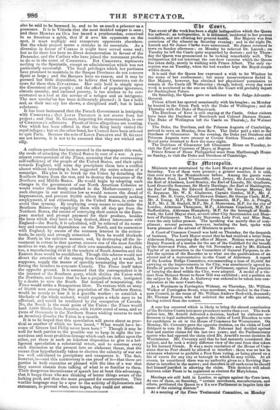A curious question has been mooted in the newspapers this
week, the mode of attacking the United States in case of a war. A pro- minent correspondent of the Times, assuming that the overweening self-sufficiency of the people of the United States, and their spirit towards England, will some day precipitate them into a conflict almost without intending it, has suggested the entire scheme of a campaign. His plan is to break up the Union by detaching the Southern States from the rest, and to destroy the resources of the Northern and Middle States. He would begin by adopting such changes in the government of our North American Colonies as would render them firmly attached to the Mother-country ; and such changes in our maritime law as would remove the dread of impressment, and prevent 30,000 sailors from constantly seeking employment, if not citizenship, in the United States, in order to avoid that tyranny. By employing every means to conciliate the Southern States—by supplying them with all they get from the. Northern States, the means of conveying their cotton to the Euro- pean market and prompt payment for their produce, besides the boon which they have so long desired, direct intercourse with England—the South, it is calculated, will be relieved of its mone- tary and commercial dependence on the North, and its connexion with England, by means of the common, interest in the cotton- trade, be easily and strongly cemented. Then he would blockade the North in the strictest manner, and, by destroying all the in- vestment in cotton in that quarter, remove one of the most forcible motives to war, the progress of their own manufactures ; and thus, too, a manufacturing rival in the markets of South America and the Eastern Seas would be annihilated. Though this scheme would not divert the attention of the enemy from Canada, yet it would, he supposes, supply the means of speedily terminating the war and forcing the invaders to evacuate Canada. The Times itself takes the opposite ground. It is assumed that the correspondent is in the interest of the Southern party, which divides the Union with the Northern, and hence that he has a prejudiced view, instigated by a desire to save the South. But instead of temporizing, the Times would strike a Bonapartean blow. To venture with an army of 30,000 men among the free population of the Northern States, would be merely to lose it in a guerilla warfare : to establish a blockade of the whole seabord, would require a whole navy to be effectual, and would be retaliated by the occupation of Canada. No, the South is the weak point of the Union : the Times would land 5,000 Blacks from Jamaica, with 10,000 stand of arms, and so (tens of thousands in the Northern States wishing success to such an invasion) dissolve the Union io a month.
It is to be hoped that this speculation will prove about as prac- tical as another of which we have beard, " What would have be- come of Greece had Philip never been born ? " Though it may be well for both parties to the possible war to keep in sight the tre- mendous and most profitless damage which each can inflict upon the other, yet there is such an inherent disposition to give to a bel- ligerent speculation a substantial retort, and to construe every such discussion as the present into an elaborate threat, that the means thus hypothetically taken to shorten the calamity of war are too well calculated to precipitate and exasperate it. The fact, however, is—and this controversy is one proof of it—that there are parties in both countries so pleased with the idea of a war that they cannot abstain from talking of what is so familiar to them. Their dangerous incontinence of speech has at least this advantage, that it keeps those who are thinking of better things aware of the lurking peril, and thus the more prepared for counteraction. This -warlike language may be a spur to the activity of diplomatists and statesmen, to prevent what, once begun, they could not arrest.


























 Previous page
Previous page